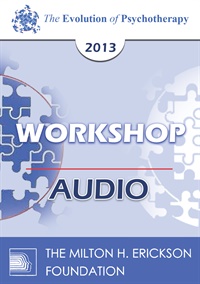EP13 Workshop 19 - It Takes One to Tango: Doing Couples Therapy with Individuals - Michele Weiner-Davis, MSW, LCSW
- Average Rating:
- Not yet rated
- Topic Areas:
- Couples Therapy | Workshops | Psychotherapy | Individual Therapy | Strategic Therapy
- Categories:
- Evolution of Psychotherapy | Evolution of Psychotherapy 2013 | Pioneers in Couples and Family Therapy
- Faculty:
- Michele Weiner-Davis, LCSW
- Duration:
- 2 Hours 11 Minutes
- Format:
- Audio Only
- Original Program Date:
- Dec 12, 2013
- License:
- Never Expires.
Description
Description: This session explores how therapists can effectively work with just one partner in couples therapy. Drawing on solution-focused methods, the presentation offers tools for setting action-based goals, avoiding blame, and restoring connection. The “last resort technique” is introduced as a powerful option when a partner wants out, helping clients shift patterns, reclaim agency, and create space for change.
Syllabus Description: That only one partner is willing to seek relationship therapy should not deter therapists, since there is much that can be accomplished. In fact, there are occasions when working with only one partner is preferable. This workshop will explore these situations and offer therapists a conceptual framework for conducting relationship-oriented sessions with one partner present.
Educational Objectives:
- Describe how seeing couples with divergent goals conjointly can be detrimental.
- Discuss how to ascertain the absent partners’ views, feelings and goals for the relationship.
- Discuss how to motivate the client to take responsibility for change in light of his/her partners’ lack of participation.
*Sessions may be edited for content and to preserve confidentiality*
Credits
Handouts
| Timestamped Transcript (1.5 MB) | 16 Pages | Available after Purchase |
| Ericksonian Learning Snapshot (250.9 KB) | 2 Pages | Available after Purchase |
Faculty

Michele Weiner-Davis, LCSW Related Seminars and Products
Michele Weiner-Davis, LCSW is the Founder of The Divorce Busting Center in Boulder, Colorado. She is a popular TEDx speaker and the author of eight books including, Healing From Infidelity, and the bestselling Divorce Busting and The Sex-Starved Marriage. She is the recipient of several prestigious awards including the Outstanding Contribution to Marriage and Family Therapy Award from AAMFT.


